THE FERRARI GTC4LUSSO DEBUTS AT THE GENEVA SHOW: CLASS-LEADING PERFORMANCE, VERSATILITY IN ALL DRIVING CONDITIONS, SUBLIME ELEGANCE
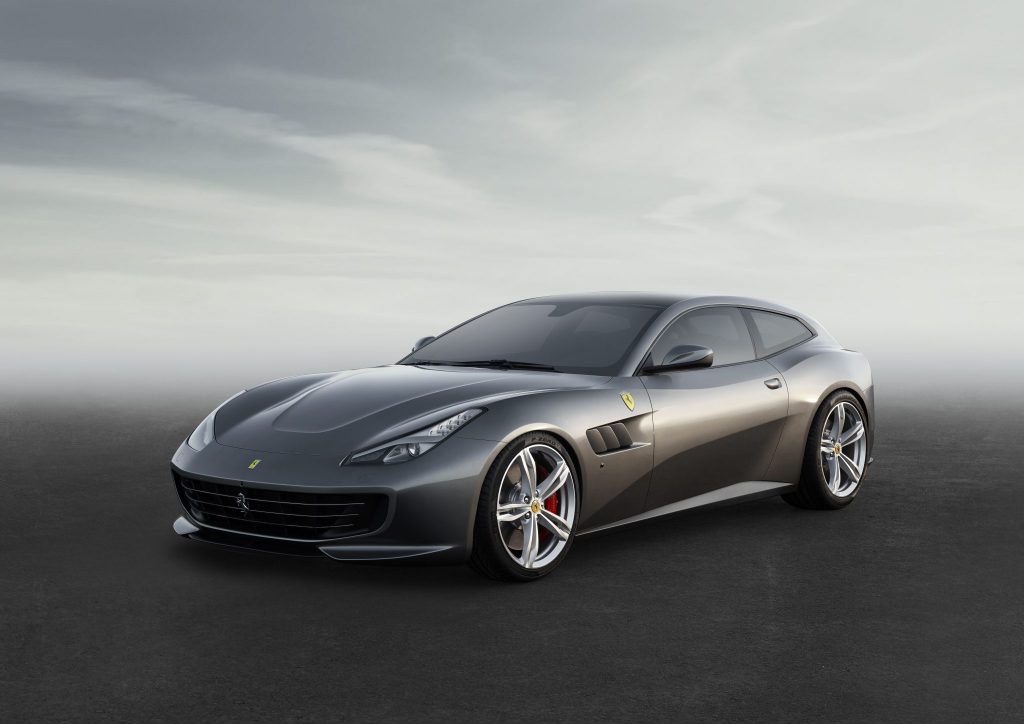
The new Ferrari GTC4Lusso is Maranello’s latest interpretation of the four-seater concept, which combines extraordinary performance in all driving conditions with sporty elegance and luxurious comfort for both driver and passengers alike.
The GTC4Lusso’s name references several illustrious predecessors, not least the 330 GTC or its 2+2 sister model, the 330 GT, as well as the 250 GT Berlinetta Lusso, which married extreme performance with stylish design and sophisticated materials and craftsmanship.
The GTC4Lusso sports the latest evolution of the naturally-aspirated Ferrari GT V12 that melds incredible power with efficiency and provides a soundtrack which is thrilling in performance driving, yet discreet and harmonious in normal touring conditions.
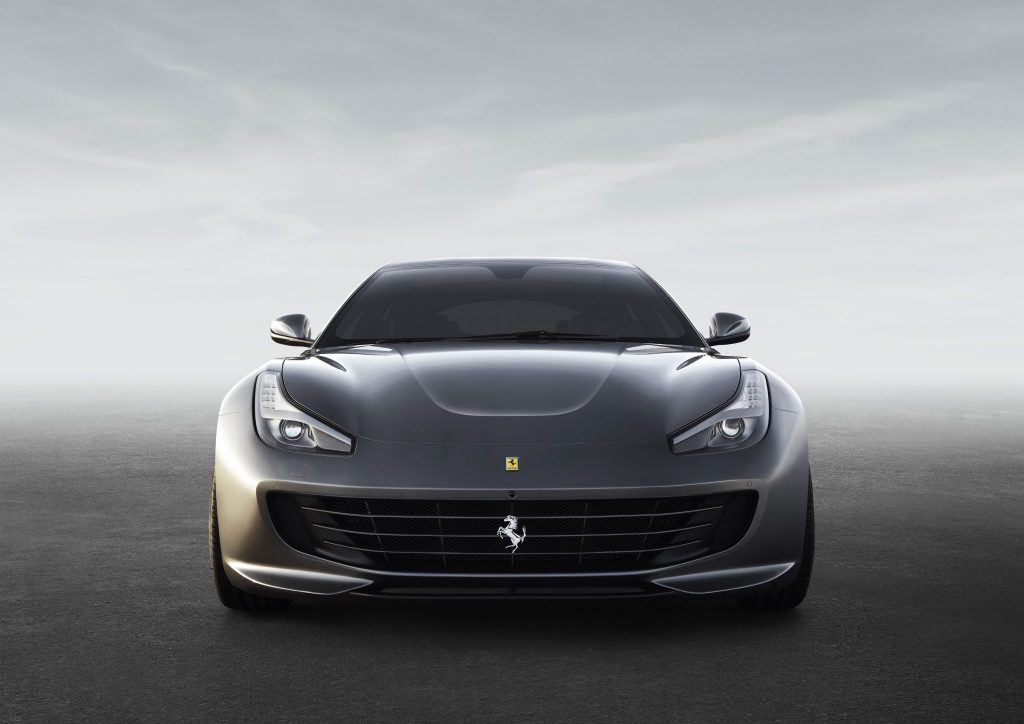
As is the case with all Ferraris, the GTC4Lusso introduces a slew of technological innovations, notably the new Ferrari-patented 4RM-S which guarantees exceptional handling even on low-grip surfaces and superb stability and responsiveness in all conditions.
The GTC4Lusso’s aerodynamic development introduced new solutions, too, including a slotted diffuser and a rear spoiler integrated with the hatch, all focused on reducing drag and improving aerodynamic efficiency.
As a result, the GTC4Lusso exudes elegance and exclusivity, its unprecedented forms underscoring its most dynamic traits in an effortless marriage of sportiness and signature Grand Tourer traits.
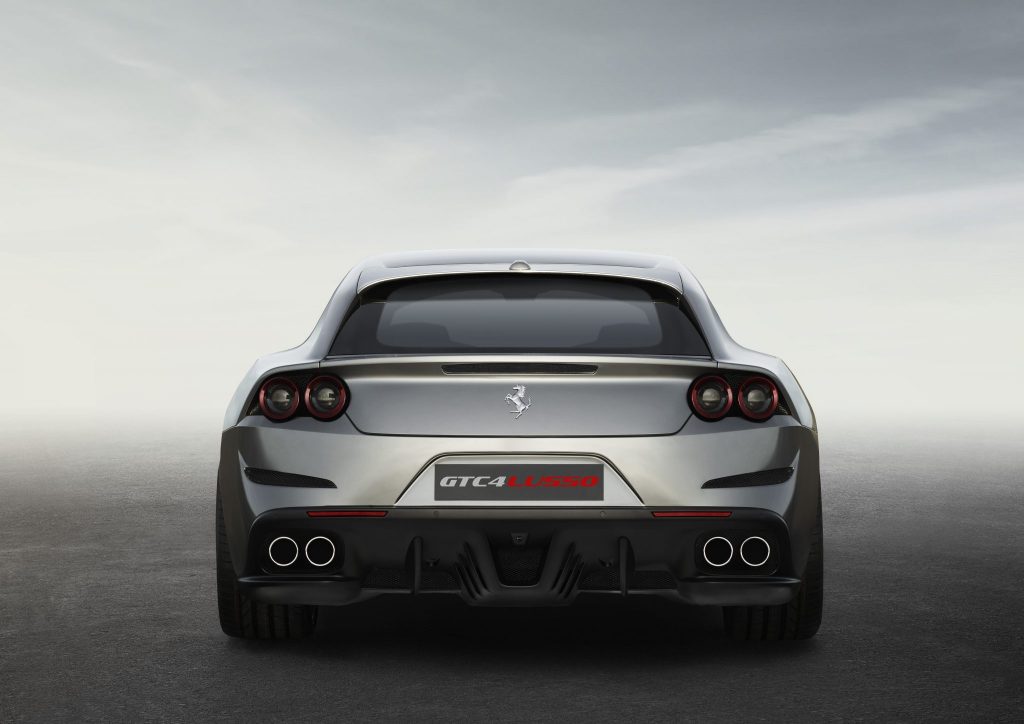
The sophisticated and refined cabin is designed wholly around its occupants. Its Dual Cockpit concept, in fact, was crafted to enhance the shared driving experience for all passengers. Maximum attention was paid to improving in-car comfort, not least in the form of a new concept for the climate control and a new navigation and media system.
ENGINE
Intense research and development has boosted the 6,262 cc V12’s maximum power output to 690 cv, making the GTC4Lusso the most powerful car in its segment. Both its 2.6 kg/cv weight-to-power-ratio and its 13.5:1 compression ratio set new records for the category, too. Underlining the strong links between Ferrari’s GT engine division the racing world, the V12 revs to a red line at a class-leading 8,250 rpm.
Maximum torque is 697 Nm at 5,750 rpm with 80% already available at just 1,750 rpm for superb responsiveness even at low revs. This makes the GTC4Lusso incredibly versatile: it is as equally at home in sports car mode as it is in more GT-type contexts, such as city centres or on long journeys.
In fact the performance figures are those of a true thoroughbred sports car, with a maximum speed of 335 km/h and acceleration from 0-100 km/h in just 3.4 seconds flat.
The new V12’s impressive performance figures are ensured by a series of leading-edge technical solutions, including newly-designed piston heads, the latest evolution of Ferrari’s anti-knock control software, multispark injection and overall weight reduction. As a result the GTC4Lusso also benefits from an improvement in specific emissions, producing just 0.51g CO2/km/cv compared to the FF’s 0.55g.
The adoption of 6-in-1 exhaust manifolds with equal length pipes and a new electronic by-pass valve, combined with the meticulous attention to perfecting engine harmonics at all engine speeds and in all kinds of throttle situations, have produced a unique, all-encompassing soundtrack that is engaging for occupants and driver alike. Providing a suitably sporting note during press-on driving, it recedes to a subtle yet potent purr in the city or on the motorway.
AERODYNAMICS
From the very earliest stages of its design, the aerodynamics research carried out on the GTC4Lusso went hand-in-glove with the development of its styling by Ferrari Design and focused on the vital area of drag reduction. Thanks to in-depth CFD modelling and numerous wind tunnel sessions, an improvement of over 6% was made on the already-excellent drag coefficient figure achieved with the FF.
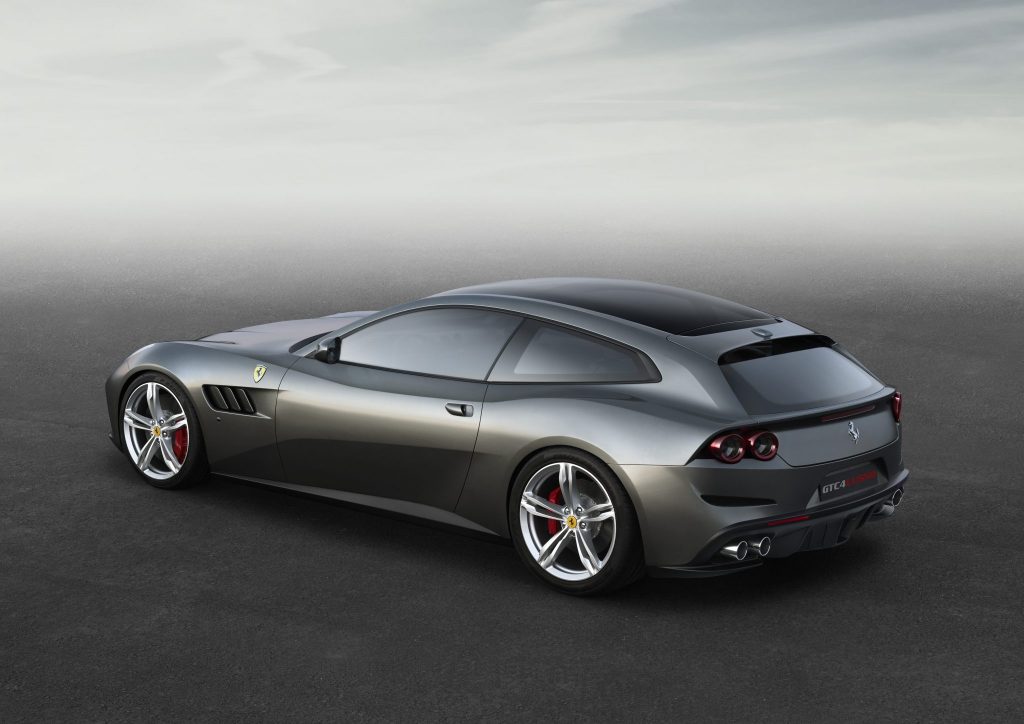
The engine’s additional power and the need to improve cooling of the radiating masses at the front of the car, whilst still reducing the drag caused by the air intakes, demanded a single, but larger grille. The air intakes are now centred towards the centre line of the car to make more efficient use of the high overall pressure values typical of this area. The side sections of the bumpers have thus been turned into one single smooth surface which improves the management of the flow in front of the wheels.
On the flanks there is now a three-louvre air vent that recalls that of the 330 GTC. Ducts behind the louvres lead to both the engine compartment and the front wheelarch thus reducing internal pressure which not only cuts drag but also boosts downforce.
The GTC4Lusso also has an innovative rear diffuser with a keel shape and vertical fences that channel the air flow towards the centre, reducing the width of the wake and, once again, cutting drag as well as accelerating extraction.
The combined action of the spoiler and diffuser moves the centre of the various pressures acting on the car towards the rear axle, increasing the grip of the steered rear wheels and thus the car’s overall drivability.
VEHICLE DYNAMICS
The FF first introduced the 4RM system integrated with the E-Diff, F1-Trac, SCM and ESC to guarantee superb traction and control in all weather conditions. The GTC4Lusso marks another major advance, by introducing new control and integration logics with the evolved 4RM system which includes the rear-wheel steering.
The improved 4RM EVO system has been integrated with the rear-wheel steering resulting in the new Ferrari-patented 4RM-S (four-wheel drive, four-wheel steering) system, which was developed around the fourth generation of the Side Slip Control (SSC4) and now also encompasses the E-Diff electronic differential and SCM-E suspension damping.
The 4RM EVO system is more precise than ever. Management of front torque in particular has been improved across the board, but specifically in terms of SS4-based Torque Vectoring which delivers and distributes torque to the front axle faster. The result is an improvement in the differentiation and precision of the torque delivery between the two wheels during cornering. At the heart of the system is the innovative use of the PTU, a Ferrari patent that delivers four-wheel drive but still, uniquely, maintains 53% of the car’s weight at the rear whilst weighing 50% less than conventional 4WD systems. Thanks to the PTU, in fact, 90% of the available torque can be delivered to the outside wheel without penalising the overall traction guaranteed by the front axle.
The rear-wheel steering system features an integrated dynamic response control model designed to make the car more nimble going into corners, thereby limiting the corrections the driver needs to make driving through and out of bends. It introduces the concept of thrust vectoring control for the first time which, via the rotation of the rear wheels, transfers excess longitudinal force to increase the lateral force generated by the tyres. This means the car reaches its limit more gradually and that there is also an improvement in the lateral acceleration that can be achieved which, in turn, delivers higher performance.
The Magnaride SCM-E damper control is also an integrated part of the 4RM-S to ensure the GTC4Lusso delivers not just superb grip and traction but also comfort on road surfaces of all types.
The SSC4 Side Slip Control System controls all the car’s components and vehicle dynamics controls. Through the information it receives from the onboard sensors and grip estimation, the SSC4 can intervene on all of the controls governed by the on-board systems thus adapt the car’s behaviour to suit differing dynamic behaviour and grip conditions.
The 4RM-S system means that drivers can fully exploit the GTC4Lusso’s extraordinary performance in all kinds of conditions. On snowy, wet or other low-grip surfaces, it delivers tremendous stability and a sensation of masterful control and security that translates into superior performance. On high-grip roads, on the other hand, the car is exceptionally nimble as well as more stable and precise with the result that it is faster into corners.
STYLING
EXTERIOR
Penned by Ferrari Design, the GTC4Lusso is a further refinement of the shooting brake coupé, reinterpreting the concept with an extremely streamlined, tapered shape that gives it an almost fastback-like silhouette.
Its sporty soul is underscored by the forms and styling of the rear where the curve of the roof has been lowered whilst retaining enough volume to guarantee exceptional space and comfort for all four occupants, as well as an ample luggage compartment.
Ferrari’s signature twin rear lights adorn the tail. These not only emphasise the car’s muscular shoulders and broaden it horizontally, but work visually with the tail pipes to lend a sense of imposing power to the rear.
Dynamically chiselled crease lines create a diapason theme along the car’s flanks, breaking up the optical mass, accentuating the muscular wheelarch and imparting a sculpted athleticism.
The front of the car is dominated by a large single grille that not only provides all the necessary cooling but also lends the car a sense of imposing power.
INTERIOR
Meticulous attention to design and carefully executed detailing has produced a cabin that is a flawless triumph of sporty luxury.
Another first for the GTC4Lusso is the new Dual Cockpit architecture designed to enhance the shared driving experience for both driver and passenger. It features both a Driver Cockpit and a Passenger Cockpit separated by a central divider on which are clustered all of the comfort-oriented controls common to both.
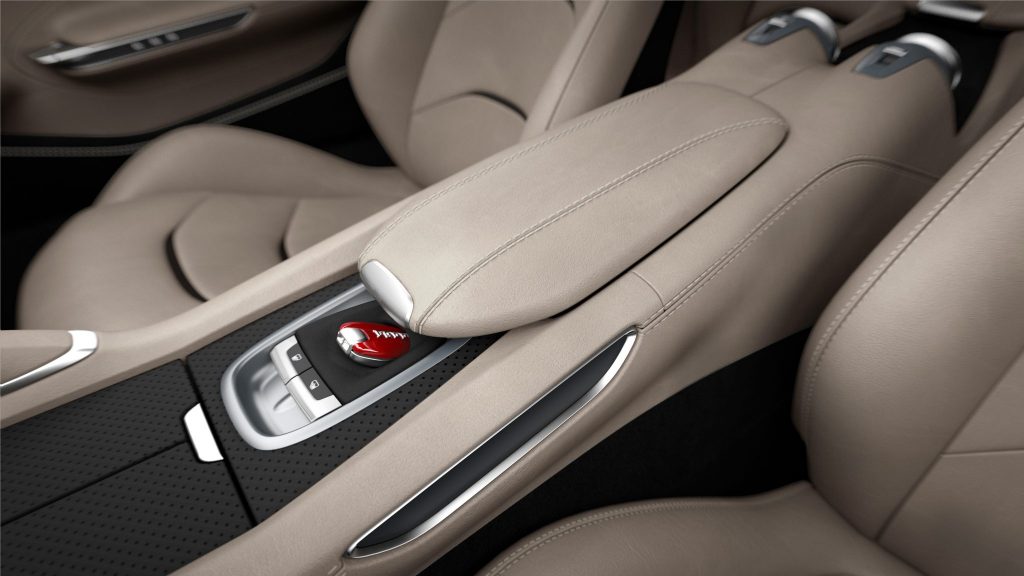
The Human-Machine Interface has also been further evolved for the GTC4Lusso: the entire Driver Cockpit has been redesigned, in fact, starting with the steering wheel which is now more compact thanks to new smaller airbag. Consequently, the instrument clusters behind the wheel are now more visible. The controls are also new and different in shape, function and positioning, with the aim of further improving ergonomics and ease of use. The same applies to all the secondary driver commands which have been revised and clustered into more convenient functional areas.
Huge attention was also lavished on the front passenger area. The Passenger Cockpit was specifically designed to ensure all commands were within easy reach. It is also more comfortable thanks to softer armrests while larger, easy-access storage compartments are a practical addition. A dedicated LCD Touchscreen lends it a very modern élan.
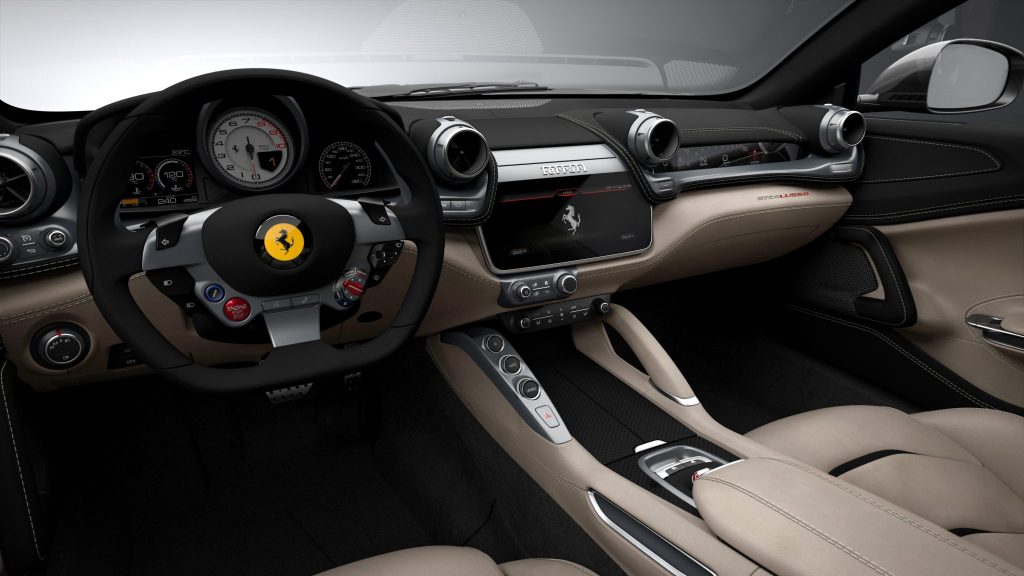
Aside from acting as a divider between driver and passenger, the central tunnel also doubles as a bridge between front and rear passengers creating the same ambience as a luxurious, relaxing living space, a fact underscored by the large, comfortable wraparound seats.
Apart from its innovative architecture, the cabin’s most striking feature is the beautiful craftsmanship of its materials which have been painstakingly selected and combined to enrich the atmosphere on board.
On-board comfort
In-car acoustic comfort is significantly better than in the FF, thanks to improved insulation from exterior noise. Needless to say, however, this does not in the least impinge on the signature sound of the Ferrari V12 in the cabin. The improved sound insulation offers greater isolation and also allows occupants enjoy the car’s audio system to the fullest, which in turn makes longer journeys more comfortable and relaxing. This was attained by a 20% improvement in rigidity of the car’s chassis attachment points, upgrading of the climate control system, which is now 25% quieter, and improved filtering and damping of intrusive frequencies through the use of cutting-edge materials with targeted acoustic properties.
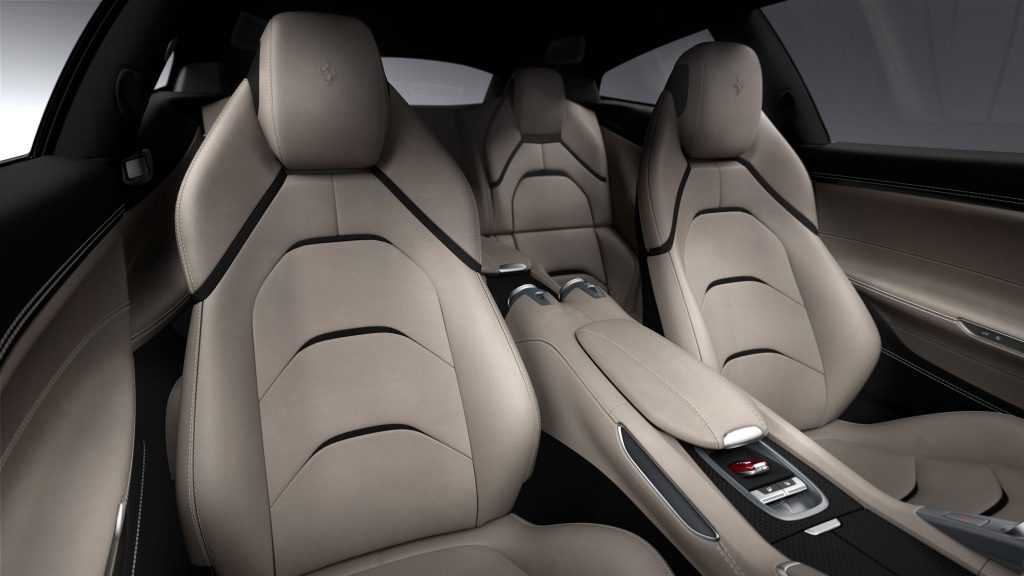
Another essential contributor to the GTC4Lusso’s in-car comfort is the significant improvement in the efficiency of the climate control system. A new ventilation concept was developed to improve the diffusion and uniformity of the air through the cabin.
To improve its sensitivity, the number of sensors that relay environmental information to the climate control system were almost doubled and a new RLFSoSe (Rain Light AntiFogging Solar Sensor) added. The climate control system’s maximum performance levels were another area of focus and it now delivers the desired temperature 25% faster.
infotainment
To underscore the GTC4Lusso’s Grand Touring prowess, Ferrari has also given it a new ultra-intuitive infotainment system that makes all of its features and content instantly accessible.
The system includes:
- A 10.25” full HD capacitive touchscreen for multi-touch use.
- New completely redesigned and simplified HMI – all functions can now be accessed both via the screen or physical controls – 2 rollers and 4 buttons.
- A new 1.5 Ghz Jacinto 6 CPU with 2GB of RAM: the processor is eight times more powerful than the previous system.
- Split View: different types of content can be viewed simultaneously.
- Sat-nav with 3D maps.
- In-cabin temperature can be set and front seat settings controlled
- Connectivity via Apple CarPlay.
Main optional equipment
Passenger Display
The GTC4Lusso features the latest evolution of the passenger display. The 8.8” colour full HD and Full Touch screen not only displays the car’s performance statistics and status as its predecessor did, but can also be used to interact with its onboard system. For instance, the passenger display can be used to select music to play even when sat-nav information is being displayed on the main central screen.
It is also possible to select a new Point of Interest (POI), such as a restaurant, and send it directly to the sat-nav even when the latter has already been set. The new POI will then automatically be added to the route. The display essentially turns the passenger into a co-driver.
Low-E roof
Low-E glass incorporates a technology that boosts in-car comfort whilst reducing heat exchange between exterior and interior. When outside temperatures are high, the specially-treated glass reflects solar rays away from the car, keeping the interior cool. However, when outside temperatures are lower, it reflects the heat inside the car inwards to cut heat loss to the outside, thereby keeping the cabin warmer. This new panoramic roof means less use will be made of the air conditioning system and occupants also enjoy an “open-air” feeling when driving.
7 Years Maintenance
Ferrari’s unparalleled quality standards and increasing focus on client service underpin the extended seven-year maintenance programme offered with the GTC4Lusso. Available across the entire range, it covers all regular maintenance for the first seven years of the car’s life. This scheduled maintenance programme for Ferraris is an exclusive service that allows clients the certainty that their car is being kept at peak performance and safety over the years. This very special service is also available to owners of pre-owned Ferraris.
Regular maintenance (at intervals of either 20,000 km or once a year with no mileage restrictions), original spares and meticulous checks by staff trained directly at the Ferrari Training Centre in Maranello using the most modern diagnostic tools are just some of the advantages of the Genuine Maintenance Programme.
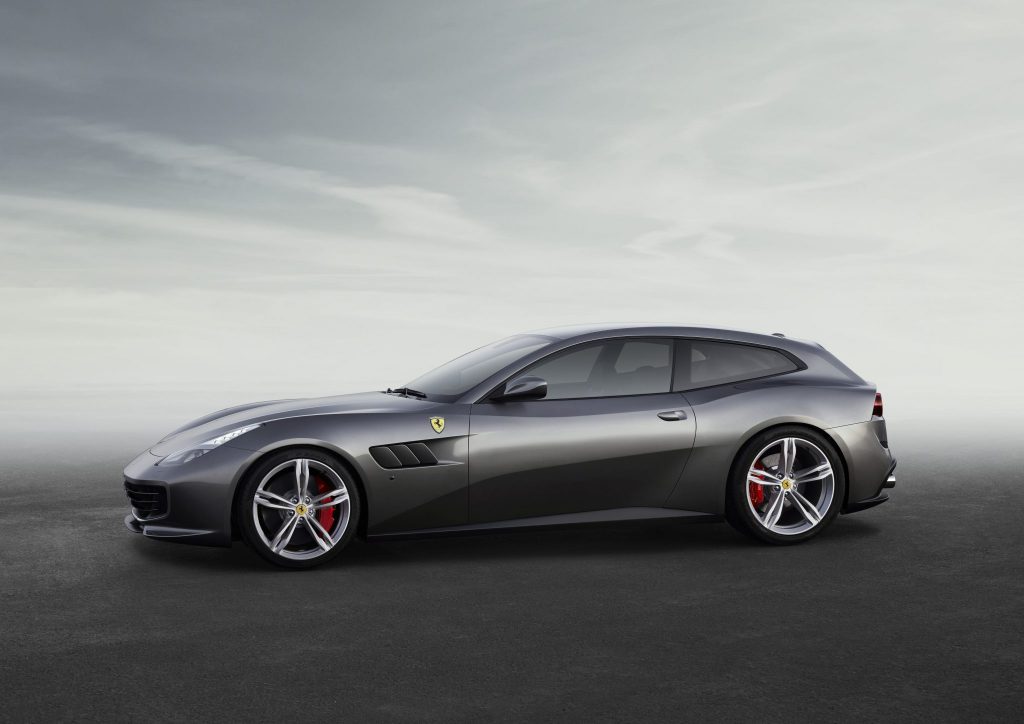
The service is available on all markets worldwide and from all Dealerships on the Official Dealership Network.
The Genuine Maintenance programme further extends the range of after-sales services offered by Ferrari to satisfy clients wishing to preserve the performance and excellence that are the signatures of all cars built in Maranello which itself has long been synonymous with leading-edge technology and sportiness.
Technical Specifications
| Engine | |
| Type | V12 – 65° |
| Overall displacement | 6262 cc |
| Bore and stroke | 94 mm x 75.2 mm |
| Max. power output* | 507 kW (690 CV) at 8,000 rpm |
| Max. torque* | 697 Nm at 5,750 rpm |
| Max. engine speed | 8,250 rpm |
| Compression ratio | 13.5:1 |
| Dimensions and weight | |
| Length | 4,922 mm |
| Width | 1,980 mm |
| Height | 1,383 mm |
| Wheelbase | 2,990 mm |
| Front track | 1,674 mm |
| Rear track | 1,668 mm |
| Kerb weight** | 1,920 kg |
| Dry weight** | 1,790 kg |
| Weight distribution | 47% front – 53% rear |
| Boot capacity | 800/450 l |
| Fuel tank capacity | 91 l |
| Wheels & tyres | |
| Front | 245/35 ZR20; 8.5” J x 20” |
| Rear | 295/35 ZR20; 10.5” J x 20” |
| Brakes | |
| Front | 398 mm x 38 mm |
| Rear | 360 mm x 32 mm |
| Transmission/gearbox | 4RM EVO/4WS/ 7-speed F1 DCT/ E-Diff |
| Electronic controls | SSC4/CST with F1 TRAC, ESP 9.0 Premium with ABS EVO/SCM-E |
| Performance | |
| Max. speed | 335 km/h |
| 0-100 km/h | 3.4 sec |
| 0-200 km/h | 10.5 sec |
| 100-0 km/h | 34 |
| 200-0 km/h | 138 |
| Dry weight/power | 2.6 kg |
| Fuel consumption | |
| Fuel consumption*** | 15 l/100 km |
| Emissions*** | 350g CO2/km |
* Engine power is expressed in kW, in accordance with the International System of Units (SI) and in CV for reasons of homogeneity. With 98 octane-rated petrol
**With optional equipment
*** Combined cycle with HELE system (ECE+EUDC)